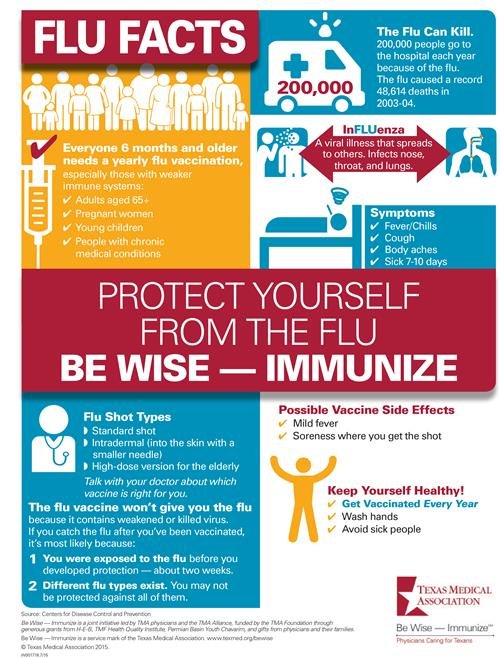It's Time for Your Flu Shot
Post contributed by Audra Gordon-Stewart, Community Health and Communications Coordinator
The time has come to get your flu vaccine.
The flu (influenza) is a contagious disease that can be severe. Almost every year, the flu causes disease in millions of people, hundreds of thousands get hospitalized, and tens of thousands die because of the flu.
The flu vaccination has important benefits. It can reduce the risk of flu illnesses, missed work/school, visits to the doctor, as well as make symptoms less severe and reduce flu-related hospitalizations and deaths.
Who should get the vaccine?
The Center for Disease Control recommends that everyone 6 months of age and older should get a flu vaccine. Different flu vaccines are approved for use in different age groups.
There are many vaccine options to choose from. There are several flu shots approved for use in people as young as 6 months old and older, and two are approved only for adults 65 years and older. Flu shots also are recommended for pregnant people and people with certain chronic health conditions.
The nasal spray flu vaccine is approved for use in people 2 years through 49 years of age. However, people who are pregnant and people with certain medical conditions should not receive the nasal spray flu vaccine.
For adults 65 years and older, there are three flu vaccines that are preferentially recommended for people 65 years and older. These are Fluzone High-Dose Quadrivalent inactivated flu vaccine, Flublok Quadrivalent recombinant flu vaccine and Fluad Quadrivalent adjuvanted inactivated flu vaccine. If none of the three flu vaccines preferentially recommended for people 65 and older is available at the time of administration, people in this age group can get any other age-appropriate flu vaccine instead.
The most important thing is for all people 6 months and older to get a flu vaccine every year. If you have questions about which flu vaccine to get, talk to your doctor or other health care professional about which one is right for you and your loved ones.
Where can you and your family get vaccinated?
Flu vaccines are offered in many places, such as physician offices, clinics, health departments, drugstores, and university health centers, as well as from many employers and even at some schools.
Protect yourself. Protect your family. Get vaccinated. #FightTheFlu
How can you tell the difference between cold and flu symptoms?
**coinciding graphic inserted here (sent separately) **
What should you do if you think you have the flu?
If you think you have the flu talk with your doctor or healthcare provider. Your physician can prescribe antiviral drugs that can be used to treat it. Antiviral drugs can alleviate the symptoms and shorten the duration of the disease. They can also prevent severe flu complications, such as pneumonia.
The CDCs recommend the use of antiviral drugs during the early stages of treatment for persons who are very sick from the flu (such as: people who are hospitalized) and those who got it and are at high risk of severe complications, due to their age or to having a high-risk condition.
Learn more: https://www.cdc.gov/flu/treatment/treatment.htm
How to avoid the spread of flu
If you are sick, the best way to reduce the spread of flu, avoid any close contact with sick people; avoid touching your eyes, nose, and mouth; cover your nose and mouth with a paper towel when coughing or sneezing, wash your hands frequently (with soap and water), and clean and sanitize the surfaces and objects that may be contaminated with the flu viruses.
If you get sick, limit your contact with other people as much as possible. Please remember to cover your nose and mouth with a paper towel when coughing or sneezing and throw the paper towel into the garbage bin after using it. Stay at home until at least 24 hours after the fever is gone, except to receive medical care o for other needs. (Before resuming your regular activities, your fever must have disappeared for about 24 hours without using a drug to decrease it).
For more information about flu, check out these CDC resources:
Flu Vaccines are Important for Children | CDC
Flu & People 65 Years and Older | CDC
Live Attenuated Influenza Vaccine [LAIV] (The Nasal Spray Flu Vaccine) | CDC

